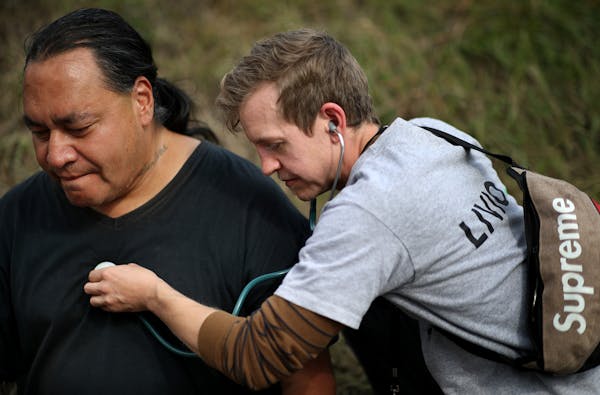Within months, the residents of the Hiawatha homeless encampment could find a new home in temporary shelters only blocks away.
The Minneapolis City Council voted unanimously Wednesday to move what some call the "Wall of Forgotten Natives" to a 1.5-acre property owned by the Red Lake Nation. It came five days after Mayor Jacob Frey and representatives of 10 tribes said the industrial site was the best alternative, after the council had rejected two other locations.
For months, dozens of people have been living in a growing tent camp along Hiawatha and Franklin avenues in south Minneapolis. Many are American Indians and have brought problems of homelessness and drug abuse to the forefront of the city's attention.
"These are our people down here," Sam Strong, secretary of Red Lake Nation who offered the location to the mayor on Friday, said after the council vote. "The reality is, as tribal leaders, we need to step up, and it's powerful when we do."
The site at 2105-2109 Cedar Av. S. won't be ready until early December because three buildings on the property need to be demolished and any residual pollution must be cleaned up, according to David Frank, the city's Community Planning and Economic Development director.
"We will go as quick as we can to have the interim navigation center operational and ready," Frank said. "We have our permitting people standing by. We have our housing team, our facilities team and our projects management all lined up to do this work."
The cost of preparing the site and setting up trailers, fencing and lighting will be between $2 million and $2.5 million, Frank said. That doesn't include providing social services to the homeless people.
Strong said the Red Lake Nation is planning to develop a six-story affordable housing complex at the site in summer of 2019, which would include 20 apartments for formerly homeless people.
At Wednesday's council meeting, Terrence Tibbetts, chairman of White Earth Nation, called on city and county officials to act quickly in moving the encampment residents into better housing.
"It's going to get cold. It's going to get relentless out there within two months," he said. "It's going to be 20, 30 below. We are thinking about public safety."
In an interview Wednesday, Frey said: "Today's council vote is a positive step and reaffirms that the site over at Cedar Avenue South is culturally appropriate and equipped to provide the necessary services, of both safety and health, for the people presently living at the encampment."
Frey had hoped to have the temporary shelters ready by early October, but city officials say it will take weeks to get the Cedar Avenue site ready.
"We have to step up to accommodate in the interim, but this is still a good option," the mayor said.
Frey said he has had continuing conversations with Hennepin County and state officials, tribal leaders and some private organizations about how to pay for the "navigation center." "No entity should be going it alone," he said.
Earlier Wednesday, Jennifer DeCubellis, Hennepin County's deputy administrator for health and human services, told a council committee that 60 individuals at the encampment were "assessed and approved for housing support." She said she doesn't know the exact number of homeless residents the county has actually moved out of the camp.
"As soon as we move somebody, somebody else is filling that tent, and that's some of the struggles of keeping track of the numbers," DeCubellis said.
Council Member Abdi Warsame, whose ward encompasses both the homeless camp's current location and the relocation site, called the tribal leaders' willingness to provide space for the homeless people a "community solution to a community problem."
"This is a very difficult issue. But we have been working hard on it, and I'm very pleased," he said.
Mukhtar M. Ibrahim • 612-673-4689

Want to share info with the Star Tribune? How to do it securely

'Safe recovery sites' would offer syringes, naloxone and more to people using drugs. The plan could be in peril.
New Minnesota GOP leaders seek peace with party's anti-establishment wing

Who is Republican Lisa Demuth, Minnesota's first House speaker of color?

